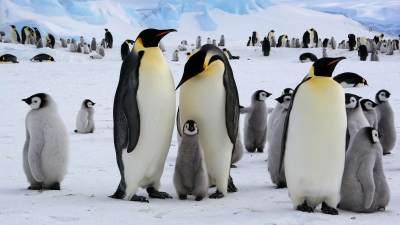
As much as 98% of colonies of this penguin species is at risk of extinction by 2100. So, the U.S. has listed the bird as “threatened” under the Endangered Species Act. There’s still hope to save them.
Where do emperor penguins live?
Different species of penguins are found in different parts of the Southern Hemisphere. The emperor penguins are found only in Antarctica, where they live and breed. Emperor penguins thrive on Antarctica’s coastlines in icy conditions any human would find extreme. The penguins breed on fast ice, which is sea ice attached to land But they hunt for food within the pack ice-sea ice floes that move with the wind or ocean currents and may merge. Sea ice is also important for resting, during their annual moult, and to escape from predators.
The U.S. lists them as “threatened”.
If current global warming trends and government policies continue, Antarctica’s sea ice will decline at a rate that would dramatically reduce emperor penguin numbers to the point that 98% of all their colonies would become quasi-extinct by 2100, with little chance of recovering, a new study has shown. That’s why the U.S. Fish and Wildlife Service finalised a rule listing the emperor penguin as “threatened” under the Endangered Species Act, effective November 25, 2022. The director of the service said the listing “reflects the growing extinction crisis”. The U.S. Endangered Species Act has been used before to protect other species that are primarily at risk from climate change, including the polar bear, ringed seal, and several species of coral, which are all listed as threatened.
But, these penguins don’t even live in the U.S.!
Sure, these penguins don’t live on US. territory, so some of the Endangered Species Act’s measures meant to protect species habitats and prevent hunting them don’t directly apply. Being listed under the Endangered Species Act could still bring benefits, though. It could provide a way to reduce harm from U.S. fishing fleets that might operate in the region. And, with expected actions from the current administration, the listing could eventually pressure U.S. agencies to take actions to limit greenhouse gas emissions. However, the Bureau of Land Management has never acknowledged that emissions from oil and gas extraction on public lands and waters could harm climate-imperiled species. It issued more than 3.500 oil and gas drilling permits in New Mexico and Wyoming on public land during the first 16 months of the Joe Biden administration.
What’s harming the birds?
The greatest threat emperor penguins face is climate change. It will disrupt the sea ice cover they rely on unless governments adopt policies that reduce the greenhouse gases driving global warming. If there’s too much sea ice, trips to bring food from the ocean become long and arduous, and their chicks may starve. With too little sea ice, the chicks are at risk of drowning. Climate change is now putting that delicate balance and potentially the entire species at risk. Emperor penguins are adapted to their current environment, but the species has not evolved to survive the rapid effects of climate change that threaten to reshape its world. Major environmental shifts, such as the late formation and early loss of sea ice on which colonies are located, are already raising the risk.
How can we save them?
Decades of data since the 1960s are now helping scientists gauge the effects of anthropogenic climate change on the penguins, their sea ice habitat and their food sources. Meeting the Paris Agreement goal could still save the penguins. The results of the new study showed that if the world meets the Paris climate agreement targets, keeping warming to under 1.5 degrees Celsius (2.7 F) compared with pre-industrial temperatures, it could protect sufficient habitat to halt the emperor penguins decline. But the world isn’t on track to meet the Paris Agreement goals. The future of emperor penguins, and much of life on Earth, including humanity, ultimately depends upon the decisions made today.
Picture Credit : Google




